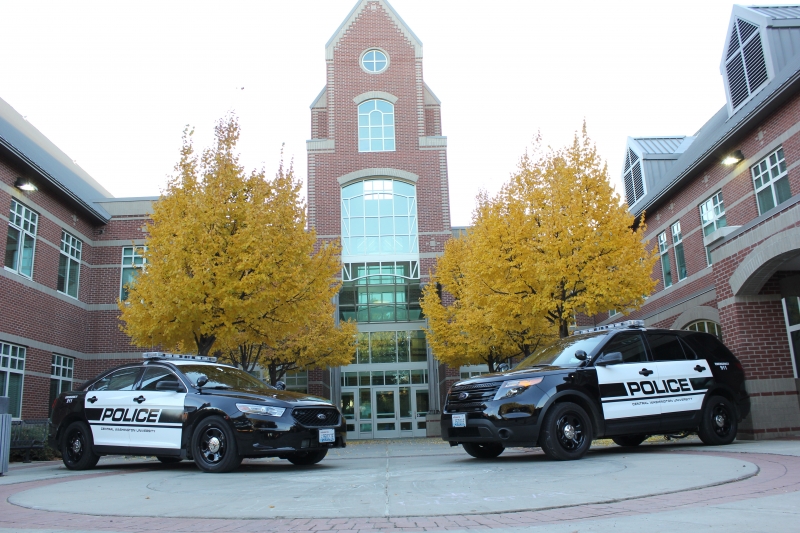Coalition of student representatives asks for less police presence on campus
May 3, 2023
A group of representatives from student organizations gathered as a coalition April 17 with members of the ASCWU Board of Directors in the SURC ballroom to discuss having more student voice and choice in the presence of campus police at campus events.
The meeting came after an open letter, signed by six organizations belonging to the coalition and outlining their mission statement and demands, was sent to the ASCWU.
The coalition included the Black Student Union (BSU), Student Union of Socialists (SUS), Japanese Student Association (JSA), Movimiento Estudiantil Chinana/o de Aztlán (MEChA), Women in STEM and Asia University American Program (AUAP), and MEChA and SUS faculty adviser Dr. Gilberto García. Members of the student senate were also in attendance.
The four-page-letter listed the coalition’s demands: that the University, President Jim Wohlpart, and ASCWU force all police presence at campus events be passed through an ESC council vote and that a committee formed through ASCWU and the ESC council review the role of police on campus.
A copy of the letter is available on The Observer website.
According to SUS Treasurer Landis Hanson, concern first arose when there were two police-sponsored events organized in February, including a self defense class and a brunch event.
“We had a concern about police being present during a self-defense class during Black History Month in the wake of the death of Tyre Nichols,” Hanson said. “And having seen no method for students to object to that at all. We had planned a protest and announced our protest as SUS and BSU.”
Hanson said that after they voiced their concerns, the two events were canceled. After BSU Equity and Service Council Representative Genet Wubbie brought it up during an ASCWU lobby day in Olympia earlier this quarter, they had a phone call with ASCWU.
Hanson said they were not boycotting the events themselves, something the groups behind the coalition mentioned in their open letter as well, but were opposed to police attendance.
“It’s not because we don’t want students to learn self defense…it’s not because we don’t want students getting free food, our concern was that it was the police that were doing it,” Hanson said. “The only people that we can’t defend ourselves from and the people who, in our opinion, take resources away from what could otherwise be used to feed students.”
According to Hanson, another event in was scheduled in March, Dare to Care, focused on providing resources to students who had been victims of sexual assault.
Wubbie said that she raised her concerns to the Wellness Center, who was hosting the event.
“We said that we felt uncomfortable with police coming to this specific Dare to Care event because of the history of police and their involvement in domestic violence, so I told them my concerns about inviting or letting them table at the event,” Wubbie said.
On May 1 President Wohlpart released a statement on cwu.edu announcing that the university was coordinating a workgroup to reassess the role of the police on campus.
“Shared governance groups on campus will be nominating their representatives this week and that committee will then discuss how the work group will proceed,” Public Affairs Coordinating Writer David Leder said in an email to the Observer.


Bell • May 5, 2023 at 3:33 pm
It shouldn’t take meetings and meetings and hours of bureaucracy to recognize that CWU Police getting their own Teslas is an egregious use of funding that could towards things like student housing, food insecurity, etc.
Steven Cook • May 5, 2023 at 8:25 am
Is there a link to the original letter? Both the print and web articles refer to it being posted to The Obeserver website, but I can’t seem to find a link.
Madison Vanravenhorst • May 9, 2023 at 1:16 pm
You can find a copy of the letter at the hyperlink within this story under “The Observer website”. Thank you for your patience!
Kay G • May 4, 2023 at 4:23 pm
I believe these students are very brave and are well informed. Learning how to speak up in thoughtful and constructive ways are skills needed for society as a whole to work together. Working arm in arm is the best way to show respect which is what this world needs more of.
Amelia • May 4, 2023 at 2:56 pm
Where is the letter: “A copy of the letter is available on The Observer website.”
Madison Vanravenhorst • May 9, 2023 at 1:16 pm
There’s a hyperlink within that quote now! Thank you for letting us know.